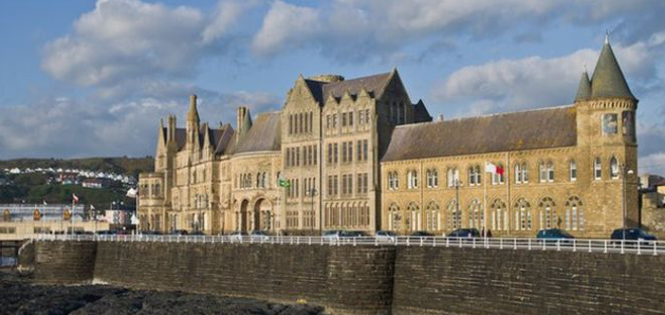Education
Brexit threat to Welsh universities

 MORE THAN 100 prospective European students have withdrawn applications to study at a Welsh university following the European referendum result.
MORE THAN 100 prospective European students have withdrawn applications to study at a Welsh university following the European referendum result.
Professor John Grattan, acting Vice- Chancellor of Aberystwyth University, said about half of those pulled out the day after the Brexit vote.
“I won’t hide it from you that Brexit poses a challenge to the university,” Prof Grattan told students during one of the graduation ceremonies this week.
“Over 100 European students have withdrawn their applications to us at this point, 50 by the end of Friday on Brexit day.
“That’s a stunning impact on our finances. There are 120,000 European students at British universities.”
The BBC has reported that Prof Grattan’s concerns do not exist in isolation, and that other Welsh Universities are also concerned about both the short -term and long -term effects on their finances.
THE CHALLENGE OF BREXIT
‘Leaving the EU will create significant challenges for Welsh universities’. Whether one considers that comment, made by Wales’s Cabinet Secretary for Education, Kirsty Williams, as unnecessary doom-mongering or a significant understatement of the size of the problems ahead, the decision to leave the EU will have a significant impact on the Welsh higher education sector.
The reliance of some institutions and some courses on relatively significant numbers of EU students to ensure viability of provision could cause considerable pressure on the already-squeezed budgets of higher education institutions.
While leaving the EU will not happen overnight – to the apparent amazement of some Brexit supporters – there will be a gradual exit process and it is that process which presents Welsh Universities with the best chance to ensure that they do not lose out as the tide of EU students studying in the UK reduces – as it surely will – and the opportunities available to Welsh students to study in the EU recede.
The EU referendum outcome will not lead to any immediate change to the immigration status of current EU students or those about to start a course in the coming academic year (2016–17). This has been confirmed in a statement from Jo Johnson, UK Minister of State for Universities and Science.
Ms Johnson said: “EU and international students make an important contribution to our world-class universities, and our European neighbours are among some of our closest research partners.
“There are obviously big discussions to be had with our European partners, and I look forward to working with the sector to ensure its voice is fully represented and that it continues to go from strength to strength.”
However, the longer term implications for EU students who want to apply to study in the UK (ie from 2017–18 onwards) will depend on the outcome of negotiations and what kind of relationship the UK agrees with the EU.
An immediate priority for Welsh universities is to urge the government to take steps to ensure students from EU countries can continue to study at UK universities on the same terms after the UK leaves the European Union and beyond.
‘EU STAFF VITAL’
Kirsty Williams has sought to address concerns raised in the aftermath of the referendum: “There is no escaping that the recent referendum has unleashed uncertainty and worry. In some cases, it may have roused the spectre of racial tensions. I want to send a message loud and clear that students and staff from across the European Union are still welcome at Welsh Universities. Those already studying here, and those who are planning to come, are still welcome – our places of learning are still there for you.
“Welsh universities will continue to recruit and teach students from across the world. The long, proud tradition of European students coming to Wales has helped us foster our relationship with many countries. There are thousands of people who have a special place for Wales in their hearts after studying here. Our country will remain a tolerant, accepting and safe place where people from any nation can pursue their academic ambitions. Let me be clear, we will not tolerate any form of racial abuse whether on our campuses or within the wider communities in which we are rooted.
“Let’s not forget EU staff are vital to the operation of our universities. We attract some of the best minds from across Europe to teach here and importantly carry out research that will benefit the people of Wales, from developing life-saving medicines to clean energy. This will not and must not change. Our universities are central to our social and economic future and they thrive through the diversity of the people who come to them.
“The Welsh Government is determined to protect Wales’ reputation as a friendly and tolerant place to study and carry out world-class research. Whatever the long-term implication of the vote, we remain an outward looking and welcoming nation where we are committed to sharing knowledge across national borders.”
STUDENT FINANCE
EU students attending universities in England and Wales who are eligible under current rules to receive loans and grants from the Student Loans Company will continue to do so for the duration of courses they are currently enrolled on, or are about to start this coming year. This has been confirmed by the Student Loans Company for England, and by Universities Wales for Wales.
Under EU law, students from EU member states applying for undergraduate degrees at Scottish universities are currently eligible for free tuition. For EU students attending a university in Scotland, the Scottish Government and Universities Scotland have confirmed that there has been no change in current funding arrangements and that eligible EU students already studying in Scotland or commencing their studies in the coming months will continue to benefit from free tuition and, for those who meet the residency requirement, associated living cost support.
EU nationals or their family members, currently in higher education, and who are assessed as eligible to receive loans and/or grants from SFW, will continue to receive these loans and grants until they finish their course. This applies to all student finance from SFW for students in Wales for which EU nationals are eligible. This includes grants and loans to cover tuition fees (for those resident in the EEA for three years), loans and grants for maintenance (limited to those resident in the UK for at least three years), and some other grants and allowances.
The rules applying to EU nationals, or their family members, who have applied for a place at university from this August to study a course which attracts student support are unchanged. SFW will assess these applications against existing eligibility criteria, and will provide loans and/or grants in the normal way. EU nationals, or their family members, who are assessed as eligible to receive grants and/ or loans by the SLC will then be eligible for the duration of their study on that course.
RESEARCH OPPORTUNITIES THREATENED
While there will be no immediate change to the UK university sector’s ability to participate in EU research and innovation programmes, such as Horizon 2020, the long term future of UK participation in European science programmes will be decided as part of the UK’s exit negotiations. These talks are expected to take up to two years. The UK will remain an EU member during this time and as such will be entitled to participate in EU programmes and apply for EU research grants.
After that point, the situation is uncertain. Although Universities UK is committed to making sure that the UK government takes steps to ensure that the UK can continue to participate in EU research collaboration and funding programmes after the UK formally leaves the European Union, the UK will be reliant upon either the goodwill or self-interest of its former EU partners. What it will be keen to avoid is the sort of relationship Canada has with the EU where it gets to participate in research but not have access to all of that research’s results.
The issue of research funding was raised during the Brexit campaign, but nobody on either side of the referendum debate appears to have given the matter any real thought or made any real preparations for the consequences of Brexit upon Britain’s research sector.
STAFFING
The UK government has confirmed that there has been no change to the rights and status of EU nationals in the UK as a result of the referendum, and that it ‘recognises and values the important contribution made by EU and other non-UK citizens who work, study and live in the UK’.
The UK remains a member of the EU for the time being and the government has confirmed that there will be no immediate changes to UK visa policies for university staff currently in, or contemplating coming to, the UK from the EU.
In terms of recruiting EU staff in the longer term, any changes will depend on the kind of relationship the UK negotiates with the EU. Universities UK (UUK) is urging the UK government to guarantee that those currently working at UK universities can continue to do so in the long term. UUK is also calling on the UK government to make a clear and unequivocal statement that any changes to immigration status will only apply to new entrants to the UK.
However, as long as the UK remains a member of the EU – that is until the end of the Article 50 process intended to manage the UK’s withdrawal – there is likely to be stasis on the issue and accompanying uncertainty.
UK STUDENTS IN THE EU
While EU students are a source of finance to UK Universities, small numbers of UK students elect to attend European universities, some because tuition fees are lower in some high quality institutions in Europe than they are (regardless of the quality of the teaching) in almost every UK higher education provider. In addition, UK students enjoy access to European Universities as part of academic exchanges as part of their courses and the Erasmus+ programme.
The Erasmus+ Programme is a European funding programme established in 1987, offering university students the possibility of studying or doing an internship abroad in another country for a period of at least two months and maximum 12 months per cycle of studies. After completing a first year of studies any student can benefit from the Erasmus+ studies and Erasmus+ placement programmes. Each student receives a grant which covers partly the costs of the stay abroad. Grants differ from sending and host countries. The grant can often be complemented by regional or national grants.
Students from UK universities currently overseas on an Erasmus+ placement, and those considering applying to participate in Erasmus+ next year (2016-17), will not be affected by the referendum result. The European Commission has confirmed that EU law continues to apply to the full in the United Kingdom until it is no longer a member. This therefore also applies to the projects financed through the Erasmus+ programme.
In the longer term, Universities UK will be urging the government to seek assurances from the EU that the UK can continue to access this valuable exchange programme. However, there are no guarantees and whether the issue will even figure as anything but a footnote in the Brexit negotiations remains to be seen.
Back to Kirsty Williams who, speaking at a graduation event at Swansea University on July 14, remarked: “Our universities are central to our social and economic future and they thrive through the diversity of the people who come to them.
“The Welsh Government is determined to protect Wales’ reputation as a friendly and tolerant place to study and carry out world-class research. Whatever the long-term implication of the vote, we remain an outward looking and welcoming nation where we are committed to sharing knowledge across national borders.”
Whether those fine words convert into educational reality is, however, very much out of the Welsh Government’s hands.
Education
Pembrokeshire youth workers lead life-changing wellbeing visit to Iceland

A GROUP of Pembrokeshire school-based youth workers recently took young people from four secondary schools on an unforgettable six-day visit to Iceland — a journey focused not only on education, but also on wellbeing, confidence and personal growth.
Funded through Taith, an international learning exchange programme for people in Wales, the trip brought together young people from across the county, many of whom had never travelled abroad before.
From the moment they arrived, the experience was designed to encourage participants to step outside their comfort zones, build resilience and develop friendships in a supportive environment.
One of the most powerful moments came as the group stood together at the Old Harbour in Reykjavik under the night sky, watching the Northern Lights shimmer above them. For many, it provided a rare pause from everyday pressures — a moment of calm, connection and awe that youth workers say will remain with them for years to come.
The group also attended Iceland’s Festival of Lights, experiencing the atmosphere of creativity, music and community spirit. Sharing the celebration helped young people appreciate the importance of culture, belonging and collective joy in supporting mental wellbeing.
A visit to the Secret Lagoon offered further opportunities to slow down. Immersed in warm geothermal waters surrounded by dramatic scenery, participants experienced the benefits of relaxation and mindfulness. Youth workers noted that these quieter moments allowed conversations to develop naturally, strengthening trust and deepening relationships.
The trip placed strong emphasis on teamwork and independence. Young people navigated travel arrangements, managed responsibilities, supported one another and adapted to unfamiliar surroundings — experiences which helped build confidence and social skills.
Meeting Icelandic peers at a local youth club was another highlight. Conversations about daily life, hopes and ambitions reinforced the idea that young people across the world share similar challenges and aspirations. These exchanges fostered empathy, broadened horizons and encouraged a stronger sense of global citizenship.
Senior Youth Worker Tristy McDermott said the impact of the visit was clear.
“We observed noticeable growth in many participants over the six days — quieter young people finding their voice, friendships forming across schools, and individuals showing resilience in new situations,” she said.
“Time away from routine, combined with positive adult support and inspiring surroundings, created space for reflection and self-discovery.
“For the young people of Pembrokeshire, this was far more than a visit abroad. It was an opportunity to build confidence, strengthen wellbeing, form lasting memories and return home with a renewed sense of possibility.”
The group extended thanks to Taith for making the experience possible.
Community
Letterston nursery equipment could be stored in cemetery

A CALL for a storage container for a “well-established and valued” Pembrokeshire children’s nursery in a nearby cemetery has been submitted to county planners.
In an application to Pembrokeshire County Council, Diane Evans of Meithrinfa Do Re Mi Nursery seeks permission for the installation of a storage container, partially in retrospect, at Horeb Cemetery, Station Road, Letterston.
A supporting statement says: “The container is required to provide essential ancillary storage to support the lawful and established nursery use within the [nearby] chapel building.
“The site forms part of an active cemetery, owned and managed by a group of trustees. The applicant is one of the trustees and has obtained formal permission from the trustees for the container to be sited on this land. The area selected previously comprised a large, longstanding mound of garden waste which has now been removed. The land has been levelled and prepared with a hard-standing base.
“The container will be used solely for storage of nursery equipment and materials, including outdoor learning resources, maintenance equipment, and items required to manage both the nursery grounds and the cemetery land. No additional operational activity will take place within or around the container.”
It adds: “The day nursery provides childcare for approximately 83 children from the local community and employs 21 staff, all of whom live locally. The nursery is a well-established and valued community facility, supporting local families and contributing positively to the local economy. Adequate storage is essential to ensure the safe, efficient and compliant operation of the nursery. The chapel building itself has limited internal storage, making external ancillary storage necessary.”
It says the nursery “operates with a strong community focus and promotes sustainability and environmental awareness,” with plans to soften its appearance through the planting of trees, shrubs and flowers.
It added: “Children will take part in a ‘sow, grow and give’ project, growing cut flowers from seed. These flowers will be made available to the community, particularly visitors to the cemetery, who will be invited to cut flowers to place on the graves of loved ones. This initiative enhances biodiversity, strengthens community links, and adds social value to the cemetery space.”
The application will be considered by county planners at a later date.
Education
Parents urge council not to close Ysgol Llansteffan

Campaigners call for delay amid Welsh language investigation and rising pupil numbers
PARENTS and campaigners have urged Carmarthenshire County Council’s Cabinet not to recommend the closure of Ysgol Llansteffan when members meet on Monday (Feb 23).
The appeal comes ahead of a proposed decision that could see the village’s Welsh-medium primary school close in August this year.
The Ysgol Llansteffan Parents and Teachers Association (PTA), supported by Cymdeithas yr Iaith, has written to councillors calling for the process to be halted, arguing that key evidence remains incomplete and that the case for closure is flawed.

Among their concerns is an ongoing investigation by the Welsh Language Commissioner into the language impact assessment used to support the closure proposal. Campaigners say it would be inappropriate for the council to make a final decision before the investigation is concluded.
They also claim no council decision-makers have visited the school to verify the information used in the proposal, despite significant changes in circumstances, including a rise in pupil numbers to 17 as of January 2026.
The PTA argues that this increase undermines earlier projections and raises questions about the reliability of longer-term forecasts used to justify closure.
Financial concerns have also been raised. While council documents suggest annual savings of around £112,000, campaigners say transport costs of approximately £50,000 per year and inflationary pressures have not been clearly accounted for, potentially overstating the net benefit.
Parents say closure would remove parental choice and risk damaging Welsh-medium education in the area by forcing some children to travel further or potentially move into English-medium provision.
Cymdeithas yr Iaith has backed the PTA’s call, warning that the council’s objection report failed to properly address concerns that insufficient school capacity elsewhere could push pupils out of Welsh-medium education altogether.
Campaigners have also criticised what they describe as factual inconsistencies in the council’s reports, including outdated enrolment figures and conflicting capacity estimates for neighbouring schools.
The PTA has asked the council to defer any decision until updated data is available, the Commissioner’s findings are published, and alternative options for sustaining the school have been fully explored.
In their letter, parents stressed they remain willing to work constructively with the council to develop a long-term solution that would allow the school to remain open as a sustainable Welsh-medium provision for the community.
Carmarthenshire County Council has previously said the proposal is intended to address falling pupil numbers, high surplus places and financial pressures at the school. Cabinet members were told earlier in the process that neighbouring Ysgol Llangain would have sufficient capacity to accommodate pupils if the closure proceeds, and that transferring learners would provide access to improved facilities and help ensure long-term sustainability of education provision in the area.
The final decision is expected to be taken by full council in March following the Cabinet’s recommendation.
-

 Health5 days ago
Health5 days agoWithybush loses emergency surgery in shock health board decision
-

 Health5 days ago
Health5 days agoHealth board confirms major hospital changes across west Wales
-

 Health4 days ago
Health4 days agoConcerns grow over Bronglais stroke plans as politicians demand clarity
-

 Health5 days ago
Health5 days agoHealth board: Changes will bring “resilience and sustainability” to West Wales services
-

 Local Government2 days ago
Local Government2 days agoCandidate who withdrew from Hakin race will still appear on ballot paper
-

 Local Government7 days ago
Local Government7 days agoIndependent group threatens to oppose council tax plans over education cuts
-

 Crime7 days ago
Crime7 days agoWoman, 79, made 141 unnecessary 999 calls putting lives at risk, court hears
-

 Crime6 days ago
Crime6 days agoSexual assault allegation to be tried





























